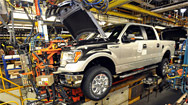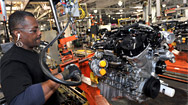Ford South America: Supply Chain
Ford’s suppliers are critical allies in helping us to achieve success in the marketplace and meet our sustainability goals.
The basis of our work with suppliers is the Ford Code of Human Rights, Basic Working Conditions and Corporate Responsibility, which applies to our own operations as well as our $90 billion supply chain. The Code addresses workplace issues such as working hours, child labor and forced labor, as well as nondiscrimination, freedom of association, health and safety, the environment and other issues.
We work to ensure that Ford and our suppliers have management systems in place to mitigate potential risks, ensure continuity of supply and improve the overall sustainability of the complex global automotive supply chain. Our aim is to leverage our supply chain – and our industry – to make a positive impact in the markets in which we do business.
We take a three-pronged approach to supply chain sustainability:
- Building strong relationships with suppliers and engaging strategic suppliers
- Developing shared commitment and supplier capability
- Collaborating within the automotive industry to develop common approaches to sustainability issues
In 2012, the Automotive Industry Action Group (AIAG) jointly sponsored (with participating automakers) supplier training sessions in Argentina, China, Mexico, Russia, Thailand, Turkey and Venezuela. More than 325 Ford suppliers attended these classroom sessions. This brings the global total for trained Ford suppliers to nearly 2,100. (This figure includes dedicated Ford supplier training sessions conducted with the AIAG as well as industry training sessions in which Ford participated along with the AIAG and other automakers.) Because attendees are required to subsequently cascade the training and expectations to the entire factory population and suppliers, these trainings indirectly reach even more companies and individuals.
In 2013, we plan to conduct additional supplier training sessions in conjunction with the AIAG in Brazil, Mexico, Romania, South Africa and Turkey. The intent is, once again, to increase the scope of impact of the training and push working conditions expectations further down the supply chain.
For a discussion of our global commitment to supply chain sustainability and detail on the status of our working conditions assessments, please see the Supply Chain section.










